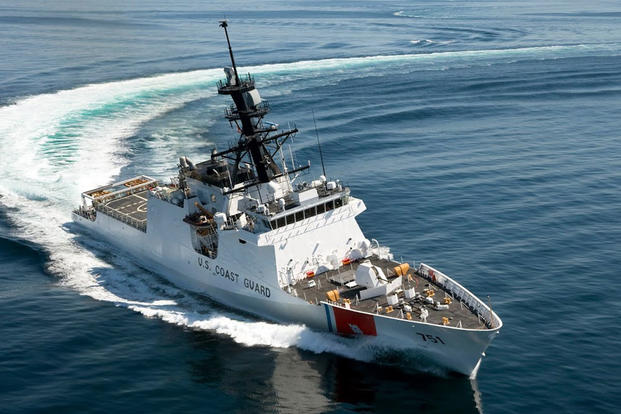The Coast Guard's leadership has outlined a new cyber strategy while renewing long-standing complaints that a lack of funding has hamstrung proven efforts to interdict drug trafficking.
The leadership last week put forward arguments for increased support of a unique service with law enforcement authority under the Department of Homeland Security for taking on missions denied by law to the military.
Adm. Paul Zukunft, the Coast Guard commandant, admitted in an appearance at a Washington D.C. think tank to "creating it on the fly" in the Coast Guard's new 41-page cyber strategy intended to mesh with the Defense Department's Cyber Command.
With existing funding, "we've created just recently a cyber command within the U.S. Coast Guard" that now has about 70 personnel, Zukunft said.
Related Video
"I never built it into my program of record. It was much quicker for me to reprogram billets" among current personnel in an effort to justify additional resources from Congress and leverage partnerships with Cyber Command, the FBI and the National Security Agency, he said.
To build upon that, the strategy paper said that "The Coast Guard must identify the personnel requirements and skill sets needed to develop a specialized cyber cadre, and then create policies and opportunities for recruiting, training, and retaining them."
The intention was to have a set of "cyber-operators" who "will be equally important to Coast Guard operations as all other operational specialties. The service must ensure that our cyber cadre has incentives to continue enhancing their skills and opportunities to advance professionally within the cyber field," the strategy said.
Zukunft said that Coast Guard cyber operators would be uniquely qualified to confront the growing threat to the nation's Maritime Transportation System (MTS) and critical infrastructure from foreign hackers.
Without naming the oil company involved, or the origin of the threat, Zukunft cited the recent example of a mobile offshore drilling rig that mistakenly downloaded malware, disabling the system that kept the platform stable.
"They drifted off the well site" but the well kept pumping oil, Zukunft said. "Fortunately, the blowout preventer kicked in and shut it down."
The strategy paper said that the "approximately 360 sea and river ports, which handle more than $1.3 trillion in annual cargo, our nation is critically dependent on a safe, secure, and efficient MTS, which in-turn is highly dependent on a complex, globally-networked system of automated cyber technology."
While Zukunft outlined the new cyber strategy, his top deputies went before Congress to renew the service's case for additional funding to interdict drugs.
In testimony before the House Subcommittee on the Western Hemisphere, Coast Guard Rear Adm. Karl Schultz said that substantial progress in limiting the flow of illicit narcotics from South America, Central America and the Caribbean was in "jeopardy" for lack of funding and ships.
Schultz, director of operations for U.S. Southern Command's Joint Interagency Task Force South, said that "Due to other global defense priorities, limited Department of Defense resources are available to source the counter-drug mission and we've been forced to rely heavily on Coast Guard support, including their personnel, aircraft and cutters."
"Come this September, the U.S. Navy will have a minimal presence in the [Southern Command] area of responsibility," Schultz said, and "for all intents and purposes the Coast Guard is the U.S. Southern Command's navy."
Backing up Schultz, Vice Adm. Charles Michel, the Coast Guard's deputy commandant for operations, testified that the Coast Guard now was interdicting only about 37 percent of the "go-fast" boats and other maritime traffic identified with "high confidence" by intelligence as drug runners.
The reason for failing to stop the drug runners "was almost always due to a lack of surface vessels" to carry out the searches, Michel said.
-- Richard Sisk can be reached at richard.sisk@military.com




























